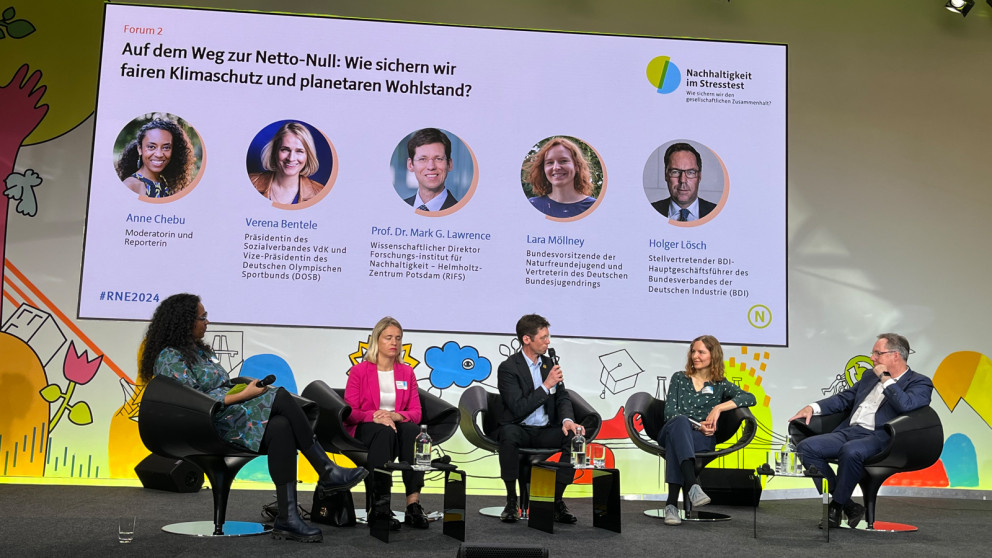Difficult, Expensive, Worthwhile: The Path to Net Zero
11.10.2024
The Paris Climate Agreement stipulates that global net greenhouse gas emissions should fall to zero in the second half of the century. Does the scientific community consider this realistic? How can the necessary measures be reconciled with the goals of economic growth and social responsibility? At the Annual Conference of the German Council for Sustainable Development, held in Berlin on 8 October 2024, Mark Lawrence (RIFS Scientific Director), Lara Möllney (Chair of German Young Naturefriends), Verena Bentele (President of the Social Association of Germany, VdK) and Holger Lösch (Deputy Director General of the Federation of German Industries; BDI) discussed these questions and more.

Anne Chebu, who moderated the panel “On the Way to Net Zero: How Do We Ensure Fair Climate Protection and Planetary Prosperity?”, began by asking Mark Lawrence about the scientific community’s views on the net zero target. “Technologies to reduce and remove CO2 from the atmosphere can only compensate for a fraction of current emissions in the foreseeable future. While prototypes do exist, these would almost certainly take decades to scale up. And only then would they be truly climate-relevant and able to offset residual emissions.” In view of this, it is important to reduce emissions quickly, Lawrence argued. However, this can only be achieved if society, business and politics work together.
“Climate protection has taken a back seat”
For many people in Germany, the climate crisis has been pushed into the background in the face of war and inflation, said Lara Möllney. Another factor in this development, is that the discourse on sustainability often puts too much emphasis on individual consumer decisions. “The fact is: when we eat kale instead of strawberries in autumn, we don’t experience ourselves as agents of change. We experience this agency when we become politically active and when our voices are heard.” Young people in particular should have the opportunity to help shape the kind of future they want to live in. Attractive participation programmes will be crucial for this.
“Investment necessary to ensure that benefits are shared”
The transformation towards sustainability will not succeed without considerable investment, said Verena Bentele. People in rural areas, for example, are often dependent on cars or lack the financial resources to install a new heating system. “We need structural changes and fair support mechanisms so that these people can also do their bit.” Bentele also noted the importance of preparing society for a changing labour market in which artificial intelligence will make some jobs redundant. People will have to be retrained for new jobs and the tax system adapted to these new circumstances: “If companies with few jobs make a lot of profit, this profit must be taxed in such a way that it enables citizens to perform socially meaningful work.” This could be funded through the introduction of luxury and digital taxes.
“Politicians must overcome their aversion to risk”
German industry is fundamentally willing and able to change, said Holger Lösch. However, the current transformation process differs from previous ones, which were driven by new technologies and the emergence of new consumer demands. “There are sound political reasons for Germany’s transformation goals. And the perception in industry is not that these can’t be achieved. But of course, German industry operates in an environment of global competition. And those who are most ambitious [in their transformation efforts] suffer disadvantages that the state cannot fully compensate.”
Politicians must overcome their aversion to risk, said Lösch, because always playing it safe will only hold back innovation. “You have to combine intelligent incentives, such as carbon pricing, regulatory law and subsidies. Ideally, technologies should be scaled up so quickly that they don’t need to be subsidised for extended periods.” However, Lösch criticised the German government’s “tentative baby steps” in the area of carbon management as lacking ambition.
Don’t play jobs and climate protection off against each other
The four panellists agreed that politicians, but also the media and other stakeholders, must not play the economy and ecological sustainability off against each other on the road to net zero. “We don’t want to protect the climate from people, rather we want to protect people from climate change,” said Mark Lawrence. Necessary changes should not jeopardise social cohesion or economic competitiveness. The audience shared this view, as confirmed by a survey conducted on site: Over 70 per cent voted in favour of prioritising jobs and climate protection equally.
Contact
